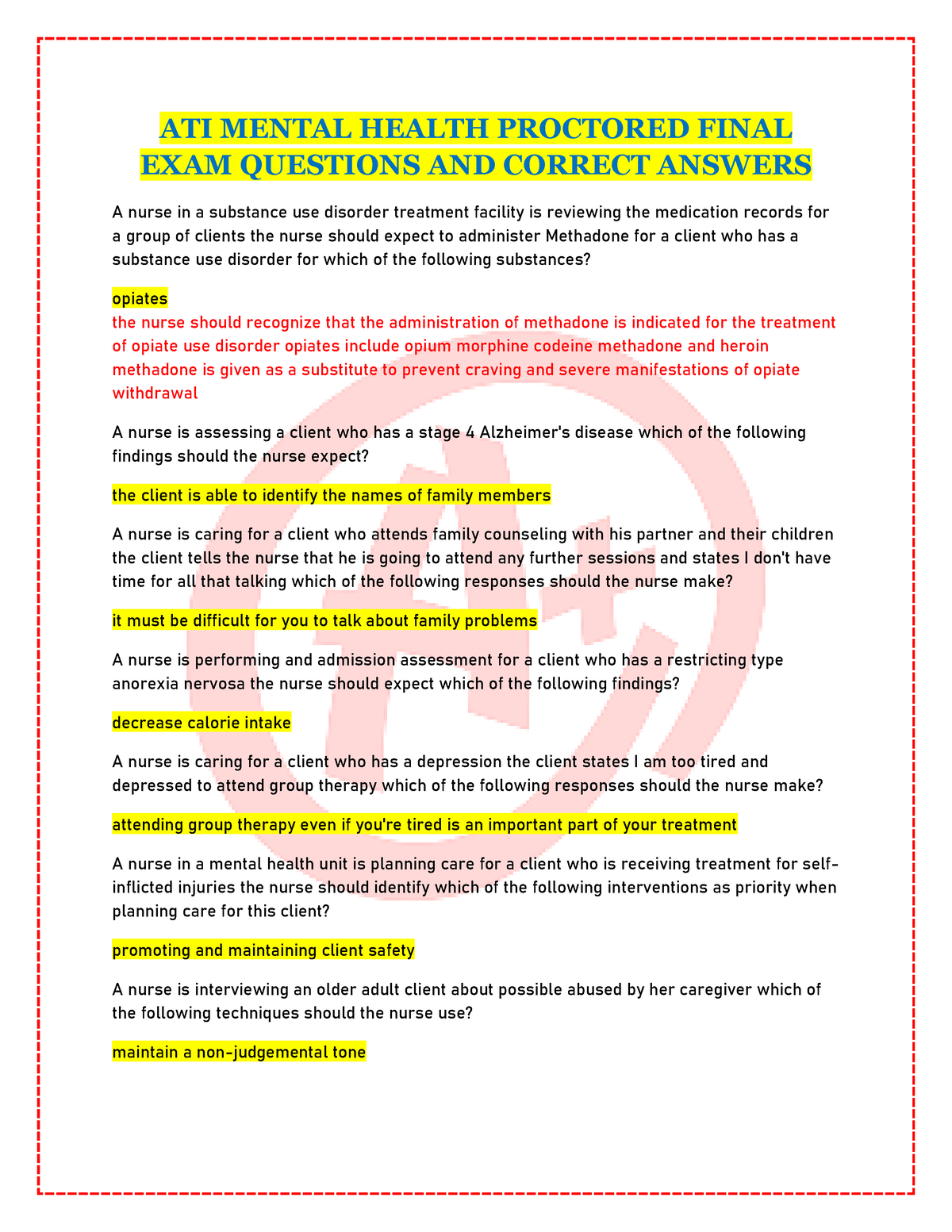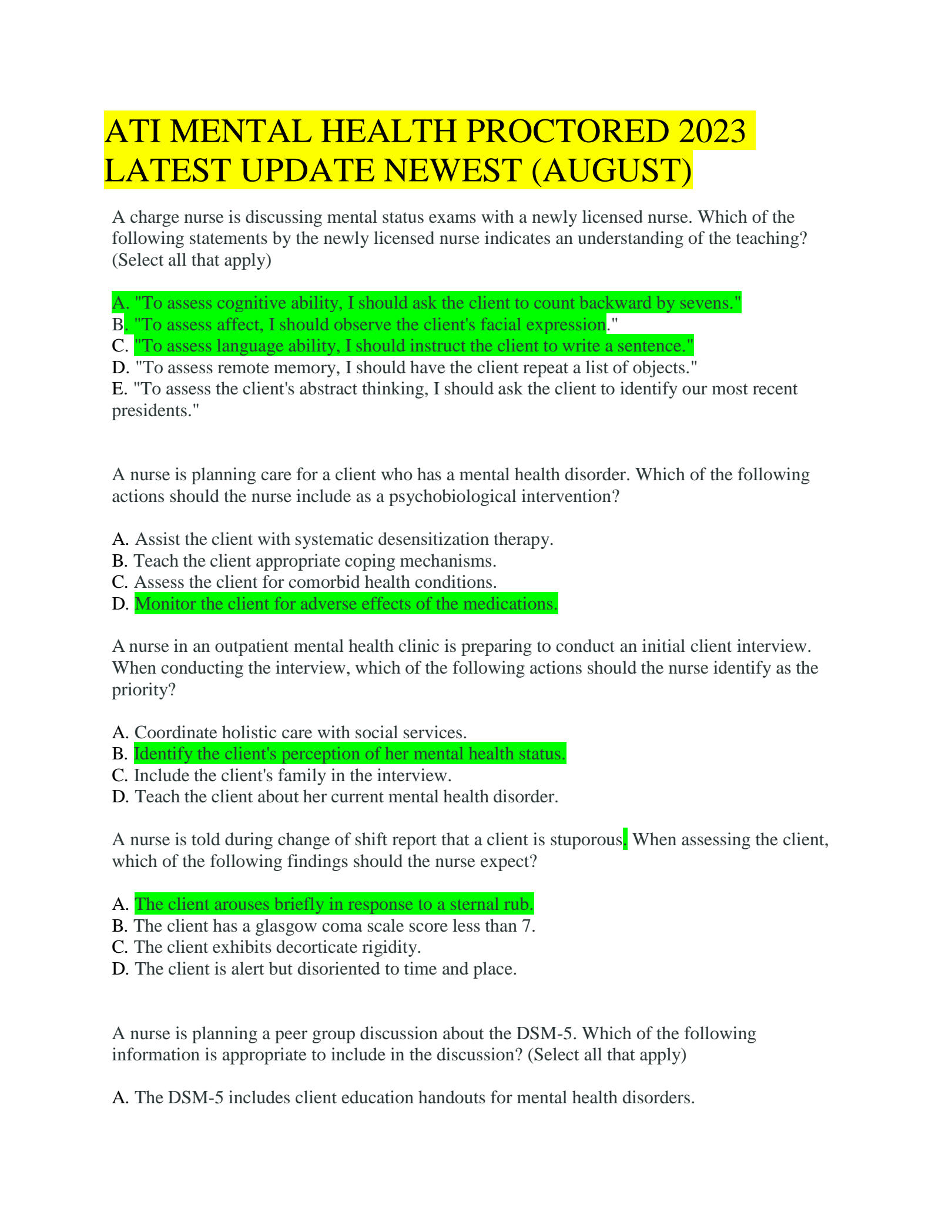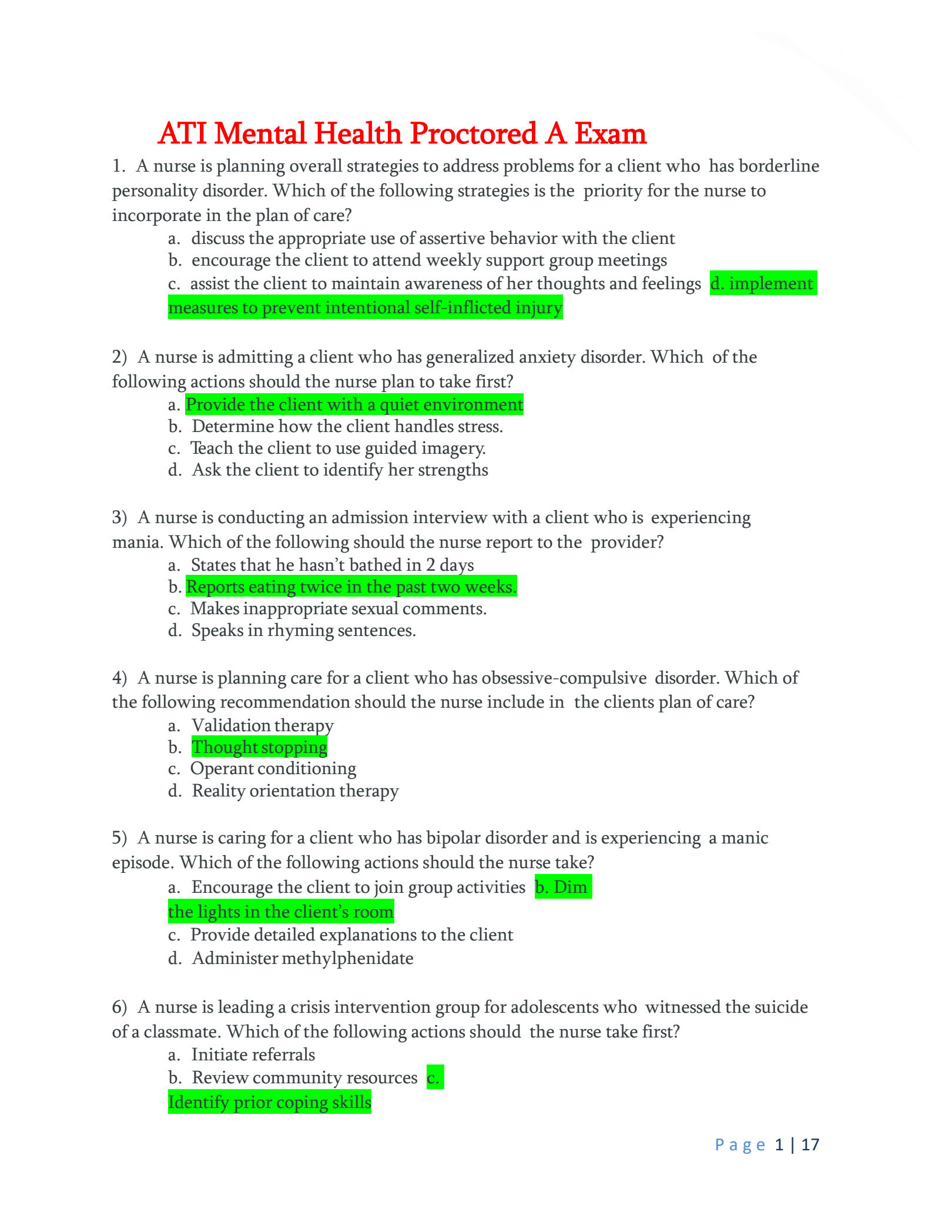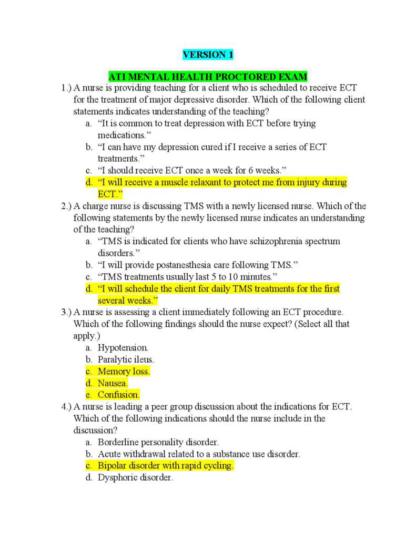What do you know about mental health and assessments related to it? Understanding mental health assessments can be a bit daunting at first, but you’re not alone in feeling that way. The ATI Mental Health Proctored Exam is designed to evaluate your knowledge and preparedness in the field of mental health nursing. Let’s break down what you need to know about this exam, from its structure to study tips, so you can approach it with confidence.
What is the ATI Mental Health Proctored Exam?
The ATI Mental Health Proctored Exam serves as an important tool for nursing students, focusing specifically on the mental health component within nursing education. This exam assesses your grasp of mental health concepts and practices vital for providing quality care.
You’ll find that this exam typically covers a broad range of topics, including major psychiatric disorders, therapeutic communication, and pharmacological treatments—elements crucial for anyone looking to enter the mental health nursing field.
Purpose of the Exam
The primary goal of the ATI Mental Health Proctored Exam is to ensure that you have acquired the necessary skills and knowledge to effectively care for individuals experiencing mental health issues. This includes understanding the complexities of mental disorders and the appropriate interventions that can be employed.
Schools often use this exam as a benchmark to evaluate student readiness for clinical practice, which can feel a bit like staring into the abyss before jumping in. It also provides you valuable feedback on areas where you may need to focus more study efforts.
Format of the Exam
You might be curious about how the exam is structured. Generally, it consists of multiple-choice questions with a few highlight scenarios designed to test your critical thinking abilities.
Here’s a simplified overview of the exam’s format:
| Element | Details |
|---|---|
| Question Type | Multiple-choice |
| Total Questions | Typically around 50-75 |
| Duration | Usually 2-3 hours |
| Scoring | Typically out of 100; some schools may have different passing scores |
Being familiar with the format can greatly reduce anxiety since you’ll know what to expect on exam day.
Key Topics Covered
Understanding the topics covered on the exam will make your study sessions more effective. The following areas are typically included:
Major Psychiatric Disorders
This section involves learning about various mental illnesses like schizophrenia, bipolar disorder, depression, and anxiety disorders. You’ll need to know the symptoms, treatments, and nursing interventions associated with these disorders.
Understanding these conditions requires a careful examination of both psychological frameworks and biological underpinnings. You might find it helpful to create flashcards that outline each disorder, key symptoms, and treatment plans.
Therapeutic Communication
One of the most critical skills in mental health nursing is effective communication. This section assesses your ability to employ therapeutic communication techniques such as active listening, empathy, and building rapport with patients.
Practicing these techniques in real or simulated settings can enhance your confidence in using them during the exam and in your future career.
Pharmacological Treatments
It’s essential to be well-versed in the medications prescribed for various mental health conditions. This topic often covers classes of medications, side effects, and nursing implications.
A simple way to reinforce this knowledge is by creating charts that summarize medication classifications, their uses, and potential side effects.
Crisis Intervention
In mental health situations, crises can occur unexpectedly. This section emphasizes your understanding of crisis intervention strategies, including assessment and action plans for acute situations. You’ll want to be familiar with both theoretical frameworks and practical approaches, as these are vital in a clinical setting.

This image is property of d20ohkaloyme4g.cloudfront.net.
Study Strategies
Effective studying can significantly ease the pressure associated with the exam. Here are some strategies you might find helpful:
Create a Study Schedule
Creating a structured study schedule can help you allocate time for each topic. Break it down into manageable chunks, so you aren’t overwhelmed. Whether you choose a weekly or daily format, having a plan will help keep you on track.
Use Practice Questions
Utilizing practice questions and previous exams can be invaluable. This not only tests your knowledge but also helps familiarize you with the question format and types of content typically covered.
Study Groups
Engaging in study groups with your peers can provide various perspectives and insights that enrich your understanding. Discussing complex topics with others can clarify confusing points and reinforce your learning.
Resources
There are numerous resources available that can assist you in studying. From textbooks to online platforms like ATI, finding the right materials can make a considerable difference.
Take Care of Yourself
As you prepare, don’t forget to prioritize your self-care. Regular breaks, good nutrition, and plenty of sleep can enhance focus and retention. Mental health is equally as important during your preparation as it will be in your future career.
Leverage Technology
Consider using apps and online platforms that offer flashcards, practice quizzes, and interactive learning modules tailored to nursing education.
Test Day Tips
When the big day arrives, being prepared can set you apart. Here are some suggestions to help you on exam day:
Arrive Early
Getting to the exam location with plenty of time to spare reduces last-minute stress. Arriving early allows you to acclimatize to the environment and mentally prepare yourself.
Read Instructions Carefully
Once you sit down, take a moment to read through the instructions carefully. This can help you avoid unnecessary mistakes from hurried reading.
Manage Your Time
Keep track of how much time you spend on each question. If you find yourself stuck, it’s often best to move on and return to it later.
Stay Calm
Remember to breathe. It’s easy to let anxiety spiral, but taking a few deep breaths can help ground you.

This image is property of sp-uploads.s3.amazonaws.com.
Resources for Success
Several resources can aid you throughout your studying process, and here are a few that are particularly noteworthy:
ATI Resources
ATI offers a variety of study materials specifically tailored for the Mental Health Proctored Exam. Their practice tests, study guides, and online tutorials can be invaluable.
Textbooks
Recommended textbooks in mental health nursing can provide in-depth knowledge and comprehensive overviews of essential topics relevant to the exam. These texts often serve as reliable references throughout your education.
Online Courses
Platforms like Coursera or Khan Academy feature courses focused on mental health nursing. These can be beneficial for visual learners or anyone seeking a different approach to the material.
Academic Journals
Keeping up with current research through academic journals can provide insights into the latest findings and best practices in mental health care.
Building a Support Network
It’s important not to go through this process alone. Engaging with others can make a significant difference in your studying and mental health.
Faculty and Mentors
Don’t hesitate to reach out to your instructors or mentors for guidance. They can provide invaluable insights and may even offer additional resources to help you prepare.
Friends and Family
Your friends and family can play a supportive role in maintaining your morale as you prepare. Sharing your goals with them can hold you accountable and alleviate stress.
Fellow Students
Connecting with classmates facing the same challenges can foster a sense of camaraderie. You can share resources, quiz each other, and provide emotional support during the process.

This image is property of sp-uploads.s3.amazonaws.com.
Understanding Test Anxiety
It’s common to experience test anxiety, especially for an important examination like this. Here are some ways to understand and cope with your anxiety:
Recognizing Symptoms
Understanding how anxiety manifests in you is the first step to addressing it. Symptoms may include racing thoughts, a rapid heartbeat, or difficulty concentrating.
Coping Strategies
Utilizing relaxation techniques, such as deep breathing, mindfulness, or even light exercise can significantly decrease your anxiety levels. Consider incorporating these practices into your daily routine leading up to the exam.
Professional Help
If you find that your anxiety is overwhelming, it may be beneficial to speak with a counselor or therapist. They can provide strategies specifically tailored to manage test anxiety.
After the Exam
Once you’ve completed the ATI Mental Health Proctored Exam, you may feel a mix of emotions. Here’s how to move forward positively:
Reflecting on Your Experience
Taking time to reflect on your exam experience can help identify what strategies worked for you and which parts of your preparation could use adjustment for future assessments.
Receiving Your Results
Upon receiving your results, take a moment to process the feedback. Look at both your strengths and areas needing improvement. Remember, this exam is just one stepping stone on your educational journey.
Continuous Learning
Regardless of the exam outcome, the learning doesn’t stop here. Continuous education is essential in nursing and mental health fields. Stay curious, keep up with advancements, and always be willing to learn from experiences—both good and bad.

This image is property of media.studylast.com.
Building a Career in Mental Health Nursing
Your journey doesn’t end with passing the exam; it’s just the beginning of a rewarding career in mental health nursing.
Exploring Job Opportunities
Once qualified, you can explore various settings, including hospitals, private practices, community organizations, and more. Each setting offers unique challenges and rewards, allowing you to chart your career path.
Continuing Education
Consider pursuing further education or specialization in mental health nursing to open up more significant career opportunities. Programs offering advanced practices can lead to roles as nurse practitioners or clinical specialists, sometimes allowing you to work autonomously.
Join Professional Organizations
Joining professional organizations, like the American Psychiatric Nurses Association (APNA), can provide valuable networking opportunities and keep you in the loop about current trends and issues in mental health.
Contributing to the Field
As you grow in your career, think about ways to contribute to the mental health field. Whether it’s through advocacy work, research, or education, your experiences will shape the future of mental health nursing.
In conclusion, preparing for the ATI Mental Health Proctored Exam might feel all-consuming at times, but remember that this journey is about more than just passing an exam. It’s about equipping yourself with the skills and knowledge you need to help others navigate their mental health challenges. Embrace the process, take care of yourself, and believe that you have what it takes to make a difference in the world of mental health. Good luck on your journey!